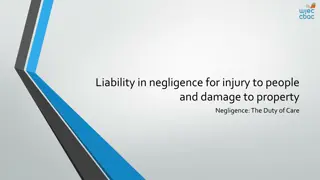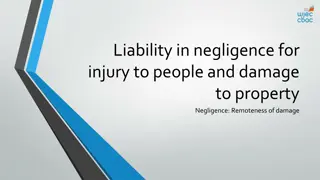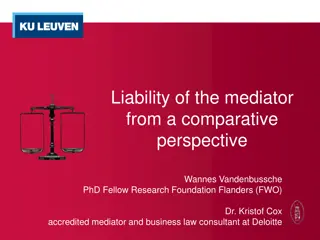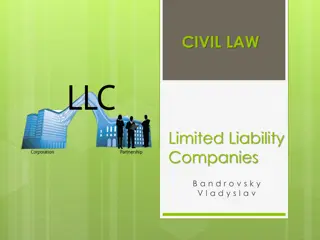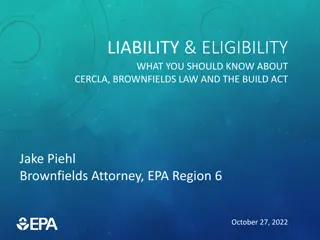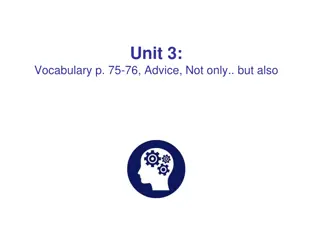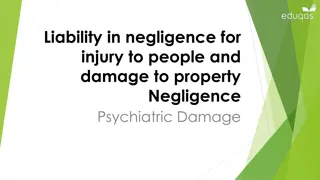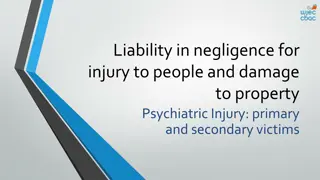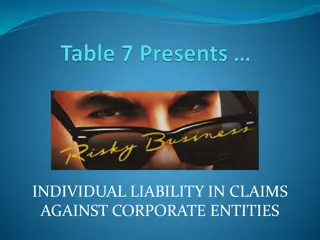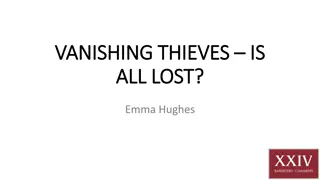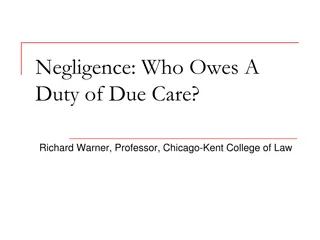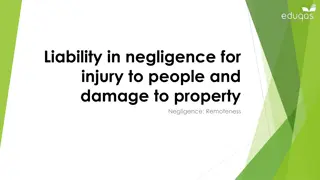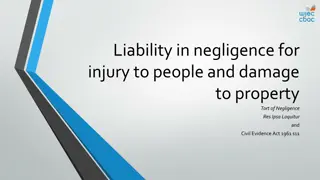Limited Liabilities Partnership
Limited Liability Partnership (LLP) is a unique business structure that combines aspects of a traditional partnership and a limited liability corporation. It offers partners the benefits of limited liability while providing flexible management and tax options. This structure is commonly utilized by
0 views • 23 slides
A CLINICAL NEGLIGENCE OVERVIEW
Clinical negligence claims require claimants to establish duty of care, breach of duty, causation, and more. Healthcare workers owe patients a duty of care to avoid physical injuries. The law on advice has evolved with cases like Montgomery, emphasizing the importance of informed consent. Recent leg
1 views • 19 slides
Managing Liability Adjustments in QuickBooks_ A Comprehensive Guide to Deletion
To delete a liability adjustment in QuickBooks, navigate to the \"Lists\" menu and select \"Chart of Accounts.\" Locate the account associated with the liability adjustment, then right-click and choose \"Delete.\" Confirm the deletion and choose \"Yes\" to remove the adjustment. Alternatively, acces
4 views • 3 slides
Legal Immunity and Liability in Kentucky State
Analysis of legal principles regarding immunity and liability in the Commonwealth of Kentucky, including factors such as public immunity, official immunity, and governmental employee liability. The content discusses scenarios where immunity may apply and exceptions where personal liability can be im
0 views • 7 slides
Understanding Contractual Liability in Construction Contracts
Contractual liability in construction contracts involves the obligations and responsibilities of parties such as investors and contractors. The liability of investors and contractors is defined by specific regulations in the Civil Code. Investors are responsible for actions like preparing the constr
0 views • 38 slides
Understanding Contributory Negligence in Legal Context
Contributory Negligence (CN) refers to negligence that materially contributes to an injury, not just a breach of duty. It involves a person failing to take reasonable care of themselves, leading to their own injury. Legal cases like Ong Ah Long v Dr. S. Underwood [1983] and Kek Kee Leng v Teresa Bon
0 views • 15 slides
Principles of Duty of Care and Civil Liability Act 2002 Explained
Understand the duty of care in legal claims, with insights from cases like Adeels Place v. Moubarak and Sullivan v. Moody. Learn practical guidance on pleading duty and explore key principles from the Civil Liability Act 2002, including foreseeability of harm and considerations for negligence.
0 views • 36 slides
Understanding Vicarious Liability in Labour Law
Vicarious liability in labour law holds employers responsible for the wrongful acts of their employees. The employer may be liable if the act was authorized, necessary for the job, capable of being ratified, and falls within the scope of employment. Various factors must be considered to establish vi
2 views • 34 slides
Liability for Misstatement in Prospectus and Available Remedies
Those who issue prospectuses to the public must provide accurate information, and if there are misstatements, there are legal remedies available such as civil liability against the company, directors, promoters, and experts. Any person who has suffered damages due to misleading information in a pros
0 views • 10 slides
Strict Liability under the Rule of Rylands v. Fletcher
Strict liability under the rule of Rylands v. Fletcher establishes that a person who brings something onto their land that is likely to cause harm if it escapes is responsible for any resulting damage, regardless of negligence. The case of Rylands v. Fletcher (1868) set the precedent for this doctri
0 views • 17 slides
Overview of Health Law Practice in Nigeria: Regulations and Challenges
The health law system in Nigeria is governed by regulations such as the National Health Act (NHA) 2014, which prioritize patient privacy rights and compulsory care for gunshot victims. Issues like negligence in medical practice are addressed through professional standards set by bodies like the Medi
0 views • 11 slides
Understanding Res Ipsa Loquitur in Proving Negligence
Res Ipsa Loquitur is a legal principle where the occurrence of an accident implies negligence on the part of the defendant. It shifts the burden of proof to the defendant, requiring them to explain the incident's cause. Originating from the Scott v London case in 1865, this principle has been applie
6 views • 19 slides
Understanding Vicarious Liability in Legal Relationships
Vicarious liability involves holding one party legally responsible for the wrongful actions of another. This liability applies to relationships such as master-servant, employer-independent contractor, principal-agent, and firm-partners. The basis of a master's liability for a servant's actions can b
0 views • 20 slides
UF Insurance Requirements and Procurement Guidelines
UF requires suppliers coming onto their property to provide proof of insurance for liability coverage to protect the university's faculty, staff, students, and property. Specific insurance requirements include Commercial General Liability, Automobile Liability, and Worker's Compensation Insurance. P
0 views • 5 slides
Understanding Negligence in Tort Law
Negligence in tort law refers to carelessness in legal terms, indicating a failure to meet the basic duty of care that a reasonable person would provide in various situations. It involves breaching a legal duty to take care, resulting in harm to the plaintiff. Key elements include duty to take care,
0 views • 8 slides
Personal Injury and Compensation Claims Overview
Stewarts law firm focuses on serious injury claims, emphasizing a client-centered approach to personal injury litigation. This presentation aims to provide a basic understanding of compensation claims for serious injuries, the difference between clinical negligence and personal injury cases, and the
0 views • 20 slides
Understanding Lender Claims in Professional Negligence Cases
Exploring lender claims in professional negligence, covering topics like breaches of duty, liability of valuers, establishing liability issues, and more. It discusses the duties and responsibilities of valuers, the potential liabilities they face, and how lenders can rely on valuations. Key cases an
0 views • 22 slides
Safeguarding Your Business: Strategies for Liability Protection
Learn essential aspects of protecting your business's legal liabilities by understanding types of liability, forming and maintaining entities like LLCs, obtaining insurance coverage, and using contracts effectively to limit liability risks. Explore key concepts such as two types of liability, entity
0 views • 17 slides
Liability in Negligence: Duty of Care in Legal Cases
In negligence cases involving injury or damage, the duty of care is crucial. The landmark case of Donoghue v. Stevenson set the precedent for establishing a legal duty of care. The House of Lords ruling emphasized the concept of a "neighbour principle," expanding the scope of liability beyond contra
0 views • 19 slides
Understanding Negligence in the Standard of Care
Exploring the concept of negligence in terms of the standard of care, exemplified by the case of Blyth v. The Company of Proprietors of The Birmingham Waterworks in 1856. The reasonable man test, defining the obligations of individuals to act in a manner consistent with a prudent person, is discusse
0 views • 8 slides
Exploring Medical Negligence: A New Specialization Opportunity
Delve into the world of medical negligence with a professional webinar series presented by experienced attorney Renier Jacobs. Gain insights on the specialized field of law, components of negligence claims, and practical examples related to Covid-19. Learn about who can be sued, recoverability of da
0 views • 60 slides
Understanding Plagiarism and Academic Negligence in Academic Writing
This content discusses the definitions of plagiarism and academic negligence, the importance of citing sources, and the consequences of academic dishonesty according to the LCC Student Code of Conduct. It emphasizes the necessity of acknowledging sources to give credit, establish credibility, and av
0 views • 32 slides
Understanding Involuntary Manslaughter: Forms and Elements
Involuntary Manslaughter encompasses two forms: Manslaughter by Unlawful and Dangerous Act and Gross Negligence Manslaughter. The former requires an unlawful act causing death, while the latter involves gross negligence leading to a fatality. Acts must be both unlawful and dangerous to constitute th
0 views • 29 slides
Understanding NC Premises Liability Law
NC Premises Liability Law in North Carolina places the burden of proof on injury victims, highlighting the challenges they may face in pursuing claims against property owners. The law requires victims to prove that property owners knew or should have known about dangerous conditions, emphasizing con
0 views • 22 slides
Understanding Economic Loss in Negligence Cases
The concept of economic loss in negligence cases involves seeking damages for financial losses distinct from physical injuries. This type of loss, whether consequential or pure, can pose challenges in proving liability and recovering compensation. Examples illustrate scenarios where economic loss ma
0 views • 11 slides
Understanding Negligence Liability in Donoghue v. Stevenson [1932]
Explore the landmark case of Donoghue v. Stevenson [1932] where the concept of negligence and duty of care was established. This case involved a woman who suffered injury after consuming a product contaminated with a decomposed snail, leading to a legal duty of care being imposed on manufacturers to
0 views • 19 slides
Liability in Negligence for Injury to People and Property
The case of Donoghue v. Stevenson in 1932 established the tort of negligence, highlighting the duty of care owed by manufacturers to consumers. The House of Lords' decision emphasized the existence of a legal duty of care beyond contractual relationships, introducing the neighbor principle. Lord Atk
0 views • 19 slides
Understanding Liability in Negligence: Tests for Remoteness of Damage
Explore the concept of legal causation in negligence cases with a focus on the tests for establishing remoteness of damage - Re Polemis & Furness, Withy & Co Ltd [1921] and Overseas Tankship (UK) Ltd v Mort's Dock and Engineering Co Ltd (Wagon Mound) (No. 1) [1961]. Discover the importance of reason
0 views • 12 slides
Liability of the Mediator in Mediation Processes: A Comparative Perspective
Exploring the liability aspects of mediators in various jurisdictions, this academic session discusses different types of liabilities, submitting liability claims, and scenarios where mediators may face liability issues. It delves into contractual, tortious, and criminal liabilities, examining the n
0 views • 11 slides
Understanding Limited Liability Companies under Civil Law
Limited Liability Companies (LLCs) under civil law in the context of Bandrovsky Vladyslav involve various aspects such as minimum capital requirements, company organs, share transfers, liability of the company and its management board, civil liabilities, and fault of company governing bodies. These
0 views • 13 slides
Understanding CERCLA, Brownfields Law, and the BUILD Act
Explore the Comprehensive Environmental Response, Compensation, and Liability Act (CERCLA) and its implications for liability, exemptions, and potentially responsible parties. Learn how the Brownfields Law and the Small Business Liability Relief Act provide protections and promote revitalization of
0 views • 44 slides
Liability for Damages Due to Nano-Particles in Swiss Law
This content discusses liability for damages resulting from nano-particles under Swiss law, covering aspects such as liability from manufacturing to disposal, contractual liability, product liability, tort liability, and more. It explains the foundations of liability in Swiss law, challenges related
0 views • 18 slides
Understanding Business Liability and Legal Obligations
Explore the concepts of liability in business partnerships, from limited liability for sleeping partners to full personal liability for general partners. Learn about legal requirements and obligations under the Companies Act and other regulations in business structures. Understand the significance o
0 views • 65 slides
Understanding Liability in Negligence for Injury: Primary vs. Secondary Victims
Explore the concept of liability in negligence for injury to people and damage to property, with a focus on psychiatric damage. Learn about primary and secondary victims, distinguishing between those who suffer physical injury and those who experience psychiatric harm. Delve into real cases like the
0 views • 23 slides
Understanding Liability in Negligence for Psychiatric Injury: Primary and Secondary Victims
Psychiatric damage resulting from negligence involves injury to the mind rather than the body, requiring claimants to prove recognized psychiatric injury with medical evidence. Primary victims suffer physical or foreseeable physical and psychiatric injuries, while secondary victims experience psychi
0 views • 23 slides
Legal Liability of Individuals in Corporate Entities
Explore the individual liability implications in claims against corporate entities, including insights on limited liability companies, dissolved LLCs, preincorporation transactions under the NH Business Corporation Act, and shareholder liability under RSA 293-A. Understand the concept of hostile wor
0 views • 23 slides
Legal Saga: Vanishing Thieves, Mishcon de Reya Case, and Barclays Bank Claim
A complex legal journey unfolds involving cases of vanishing thieves, solicitors held accountable for breach of trust, and a bank claim disputed in court. Dreamvar Ltd. faces challenges pursuing recovery as Mishcon de Reya escapes negligence claims. In a separate case, Mrs. Philipp's negligence clai
0 views • 7 slides
Duty of Due Care in Negligence Law: Who Owes It?
Richard Warner, a Professor at Chicago-Kent College of Law, discusses negligence and the duty of due care in various scenarios. The concept of duty of care is explored in relation to strangers, like in the case of Rachel and Roger, with an emphasis on exceptions. Blackbaud, a cloud software company,
0 views • 16 slides
Understanding Liability in Negligence: Remoteness and Causation
Explore the concept of legal causation in negligence cases by delving into the tests for establishing remoteness. Dive into landmark cases like Re Polemis & Furness, Withy & Co Ltd. [1921] and Overseas Tankship (UK) Ltd v. Morts Dock and Engineering Co Ltd or (Wagon Mound) (No. 1) [1961] to understa
0 views • 12 slides
Understanding Res Ipsa Loquitur in Negligence Law
Res Ipsa Loquitur is a legal principle where the occurrence of an accident implies negligence by the defendant. This doctrine creates a presumption of fault against the defendant, who must then offer an explanation to rebut this presumption. The case of Scott v. The London and St. Katherine Docks Co
0 views • 15 slides
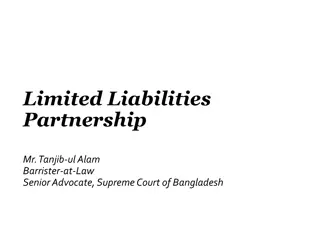
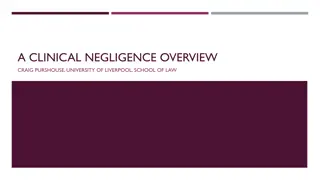
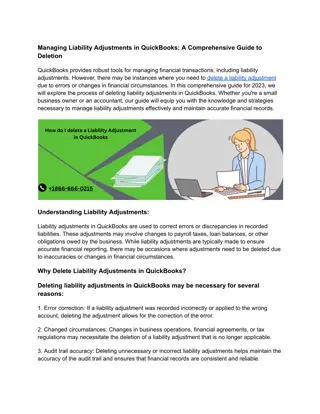
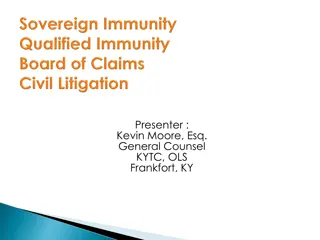
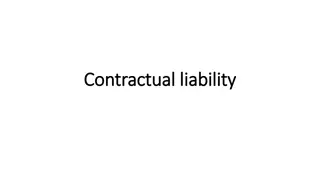
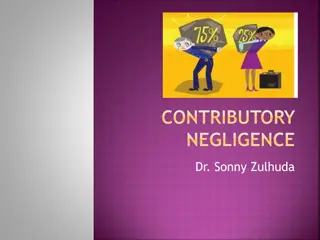
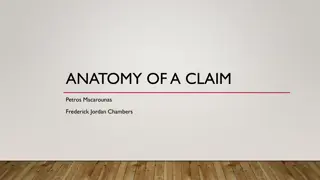
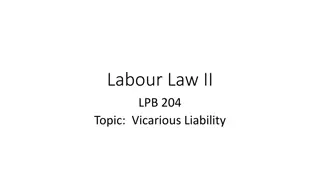
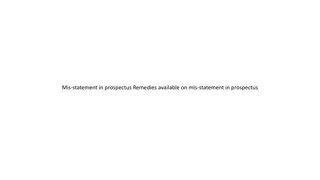
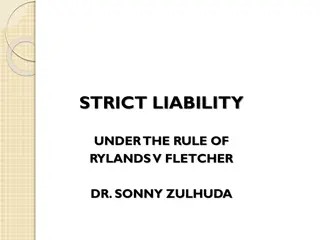
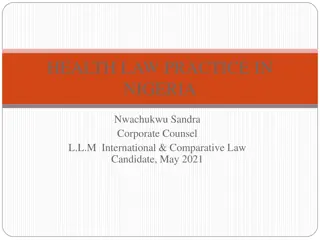
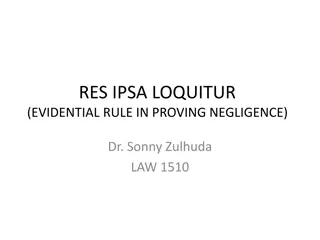
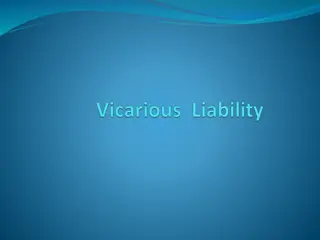
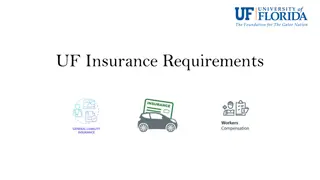
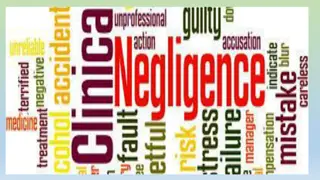

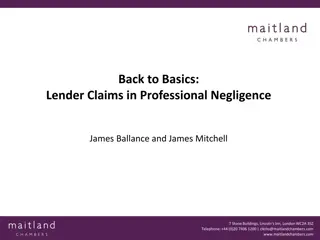


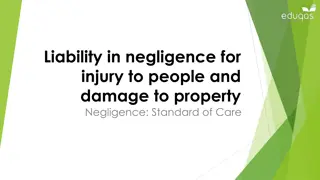
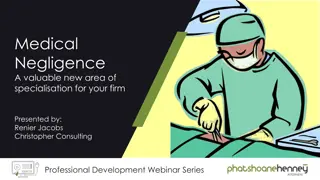


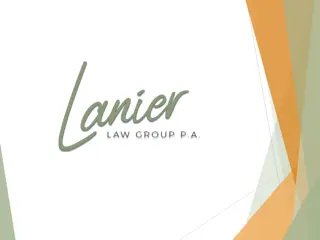
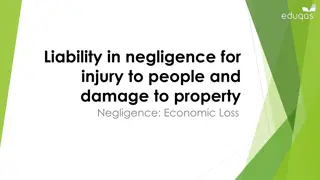
![Understanding Negligence Liability in Donoghue v. Stevenson [1932]](/thumb/198881/understanding-negligence-liability-in-donoghue-v-stevenson-1932.jpg)
